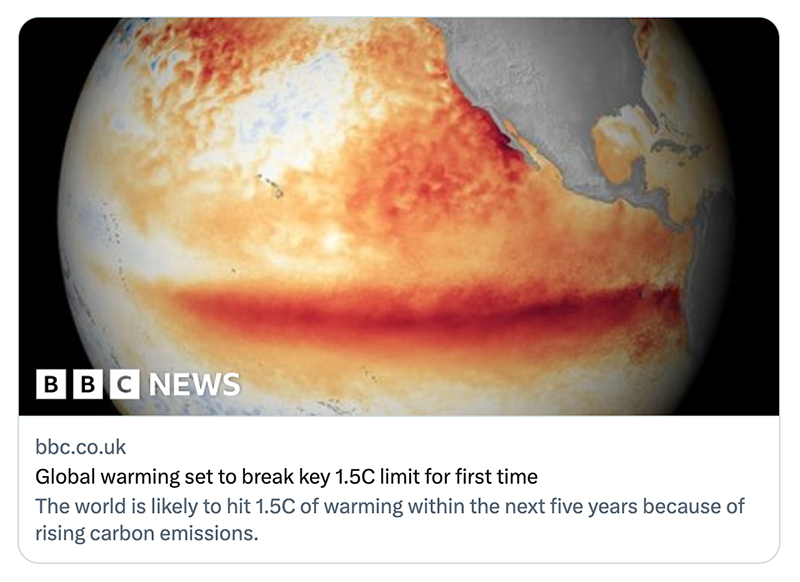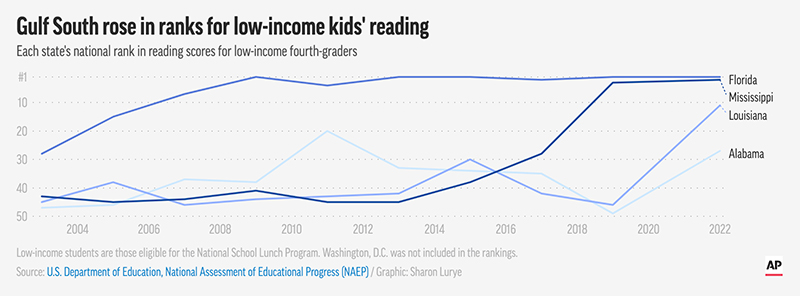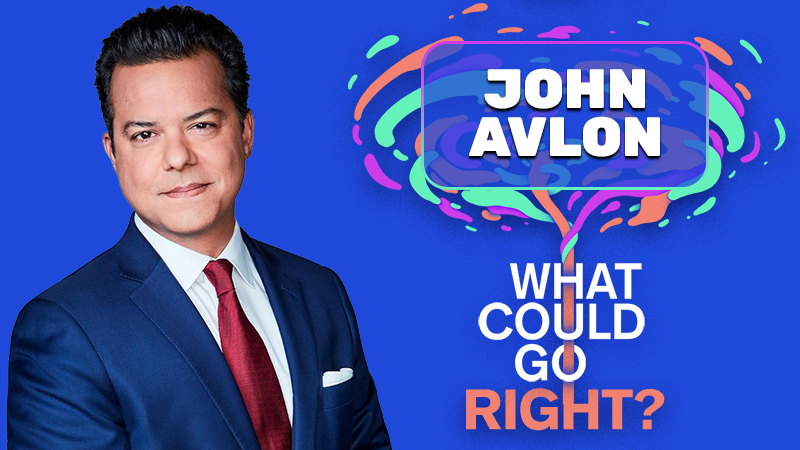Volcanoes are erupting in The Philippines, but on-fire Australia received some welcome rain. The Iran war cries have been called off and The Donald’s military powers are about to be hamstrung by the Senate. Meanwhile, his impeachment trial is starting, and we’re all on Twitter for a front-row seat.
What Could Go Right? Climate doomscrolling strikes again
What do recent headlines on the world breaking the 1.5C limit for the first time mean?
This is our weekly newsletter, What Could Go Right? Sign up here to receive it in your inbox every Thursday at 6am ET. You can read past issues here.
Climate doomscrolling strikes again
Last week it’s likely you saw a lot of headlines like this one:

If you didn’t read the article—or didn’t finish it—you might be left thinking that we have already passed the level of warming that the world set as a target at the 2015 Paris Agreement.
Luckily for those of us prone to climate anxiety, a host of climate scientists and researchers, including Jonathan Foley of Project Drawdown and Zeke Hausfather of Berkeley Earth, have clarified what these headlines mean and don’t mean.
Most importantly, they don’t mean that we have breached the Paris Agreement target. We will not have done that until the average temperature across 20 or 30 years has surpassed 1.5 Celsius. Our best estimates still indicate that that will happen in the early 2030s (not that that is good, but it’s not now).
The numbers highlighted in recent headlines come from a new report by the World Meteorological Organization (WMO), which says that it’s more likely than not that we’ll see, between 2023 and 2027, the Earth’s temperature go past 1.5C of warming for at least one year, but that it’s unlikely that the average temperature across five years will. In other words, the rise above 1.5C will likely be temporary.
This temporary rise is due to increasing global emissions but also due to the meteorological event El Niño/La Niña, warming and cooling phases in the Pacific Ocean that we flip between every few years. We’re about to finish a cooling La Niña phase and enter a warming El Niño one. So the WMO expects us to surpass 1.5C while El Niño does its thing, but come back down again when it’s done.
This does not mean, of course, that we can kick back and relax when it comes to climate change. Absolutely not! All the usual climate change context about emissions driving warming and needing to decarbonize ASAP remains. As data scientist Hannah Ritchie points out in her excellent explainer of the WMO report, temperatures during “cool” La Niña phases are now “much higher than they were during warm El Niño phases from decades ago.”
But as she also says, it’s important that updates like this one from the WMO are communicated and understood correctly, so we can engage with them correctly as well. To highlight two risks that misunderstanding these headlines pose from opposite ends of the “common responses to climate change” spectrum, Ritchie writes:
. . . there is the impact on peoples’ mental health. Many people (wrongly) believe that 1.5C is a catastrophic boundary: that once we cross it, the fight is over. To tell people that this is coming in a few years is to tell them that the end is near. . . .
And,
. . . it gives ammunition to climate deniers. There are a range of negative impacts that are projected to happen in the 1.5–2C range. Many won’t happen after just one or two years at 1.5C. But skeptics will use this to their advantage. “See, they said that X was going to happen at 1.5C. We’ve reached that point, and it hasn’t happened. Scientists have been lying.”
To be fair to the BBC, the article itself is decently clear on all of the above. But from what I have seen, quality of coverage has varied across outlets, and additional clarification in the age of doomscrolling headlines never hurts. As Project Drawdown’s Foley tweeted, “Be wary of money- and attention-seeking headlines that are designed to scare you.” To that I would add, read articles in their entirety whenever you can!
Quick hits
Long range anxiety, begone. Battery startup Gotion High Tech, a supplier to Volkswagen, just announced a new lithium battery that can last up to 1,000 kilometers, or about 620 miles. Mass production is scheduled to begin in 2024.
This is curious: effective weight loss drug Ozempic may also curb addictive and compulsive behaviors, from binge drinking and shopping to picking skin. The evidence is just anecdotal experience so far, but researchers are interested in pursuing the matter.
Last week, Minnesota’s governor, Tim Walz, signed two pieces of gun reform legislation, one a red flag law and the other for universal background checks. Michigan followed quickly on its heels, with Governor Gretchen Whitmer signing a red flag bill into law on Monday. Those two bring the count to 21 US states that have passed red flag laws since 1999. By the way, The Trace, a nonprofit newsroom that covers only gun violence, has just launched a solutions-based newsletter that looks interesting.
Below in the links section, so long, acid rain; hello, preeclampsia blood test; see you soon, revolutionized prosthetics; and more.
By the Numbers
A pop-up section in which we celebrate numbers that represent substantial improvement in people’s lives
8.6%: Malaria prevalence in children in Ghana, down from 26.7 in 2014
83.36%: The decline in malaria deaths in India between 2015 and 2022
12%: The decline in new HIV infections in the US between 2017 and 2021

Is moral progress a myth?

Some say we’re moving backwards. But the evidence—including the international abolition of slavery, global declines in violence, and a rise in rights for the disenfranchised—says otherwise. | Read more
How to Be Optimistic About America | S4 E15

What road is hyperpartisanship taking us down? Can we learn from our history? And is the current state of American politics worse than ever before? Today, we talk with CNN’s senior political analyst and author of Lincoln and the Fight for Peace, John Avlon, to discuss how the past can inform our understanding of and response to current political conditions. | Listen to the episode
Progress, Please
(Found good news? Tweet at us @progressntwrk or email.)
Other good stuff in the news 🐷
Energy & Environment:
- The end of acid rain | Works in Progress
- How solar power is keeping Lebanon’s lights on | BBC
- The European countries setting new wind and solar records | Euronews
- India to close around 30 coal mines in next few years to pave way for forests, water bodies | The Times of India
- How Toronto’s Don River, once declared dead, is roaring back to life | The Guardian
- Bird flu vaccine authorized for emergency use in California condors | The New York Times
Public Health:
- Preeclampsia blood test wins FDA clearance | The Wall Street Journal
- Benin and Mali have eliminated trachoma as a public health problem | Africa Renewal
- Half of children given ‘skinny jab’ no longer clinically obese, study finds | The Guardian
- Why suicide rates are dropping around the world | Wired
- Pancreatic cancer mRNA vaccine moves closer to reality | Bloomberg
- Drug for hot flushes will transform menopause treatment, doctors say | The Guardian
- The FDA just approved a rub-on gene therapy that helps ‘butterfly’ children | MIT Technology Review
Science & Tech:
- Study offers new twist in how the first humans evolved | The New York Times
- Microwave device could be less invasive treatment for HPV-caused cancers | The Guardian
- A shocking discovery about phantom limb sensations could revolutionize prosthetics | Inverse
- Your iPhone’s AI brain will soon be able to speak in your voice | TechRadar
- No, 50% of AI researchers don’t believe there is a 10% risk that AI will kill us | Warp News
Politics & Policy:
- Supreme Court’s ruling on Prop 12 is a win against factory farming. But the pigs’ lives will still suck. | Vox
- More states join California’s push to phase out gas cars by 2035 | Bloomberg Law
- Boston rolls out free digital libraries at some bus stops | NBC Boston
- SCOTUS makes landmark decision recognizing transgender person’s pronouns | The Independent
- Same-sex couples will now have full adoption rights in Taiwan | NPR
- Inside the winning fight for affordable child care in Vermont | Vox
Society & Culture:
- Companies are finally designing offices for the new work reality | Time
- Greece recovers hundreds of stolen artifacts | BBC
- The first 10 words of the African American English dictionary are in | The New York Times
Economy:
- Electricity prices plunge by 75% as Finland opens new nuclear power plant | OilPrice
- Job prospects for black workers have never been better—in ways that might last | The Wall Street Journal
- US universities are building a new semiconductor workforce | IEEE Spectrum
- Greece’s ‘greatest turnround’: from junk to investment grade | Financial Times
- The no-interest loans helping Australians get back on their feet | The Guardian
- Imagine a renters’ utopia. It might look like Vienna. | The New York Times
TPN Member originals 🧠
(Who are our Members? Get to know them.)
- Is AI anxiety overblown? | Robert Wright
- Will humanity survive AI? | Yascha Mounk
- The 3°C Scenario: What’s the economic impact of severe global warming? | James Pethokoukis
- Europe’s energy security challenge | Jason Bordoff
- John Durham’s final report | Isaac Saul
- The border crisis: Finding solutions in the midst of chaos | Isaac Saul
- Don’t overreach on anti-trust. Do this instead. | Zachary Karabell
- The contrarian case for Pakistan’s upside | Zachary Karabell
- What Josh Hawley gets wrong about me | Richard V. Reeves
- An unfiltered conversation with Lloyd Vogelman and Francisco Ferreira | Emma Varvaloucas
- The only career advice you’ll ever need | Arthur C. Brooks
- A conversation with economist Simon Johnson on his new book Power and Progress with Daron Acemoglu | James Pethokoukis
- The Supreme Court is right about Google and Twitter. Now Congress must act. | Bina Venkataraman
- Turkey points to a global trend: Free and unfair elections | Fareed Zakaria
- The road to repair: Pete Buttigieg and crumbling US infrastructure | Ian Bremmer
- We hit rock bottom on civics education. Can we turn it around? | Danielle Allen
- Soft power may determine the fate of Twitter | Penny Abeywardena
Department of Ideas 💡
(A staff recommendation guaranteed to give your brain some food for thought.)
A Thread on Stealth Camping | Twitter
Why we picked it: This is a rare staff pick that is not an article but a Twitter thread that went viral, written by an inveterate traveler named Randy who chose to live on the road for over five years. He shares his methods of how to find a place to sleep anywhere, from the side of highways to the middle of corn fields, and talks about how the constant travel and long periods of isolation changed him. It’s fascinating, to say the least. If you’re intrigued, Brian recommends the book Freedom by Sebastian Junger, which covers similar themes. —Emma Varvaloucas & Brian Leli
Until Next Time
We regret to inform you of some baaaad news out of New Zealand. 🐑


